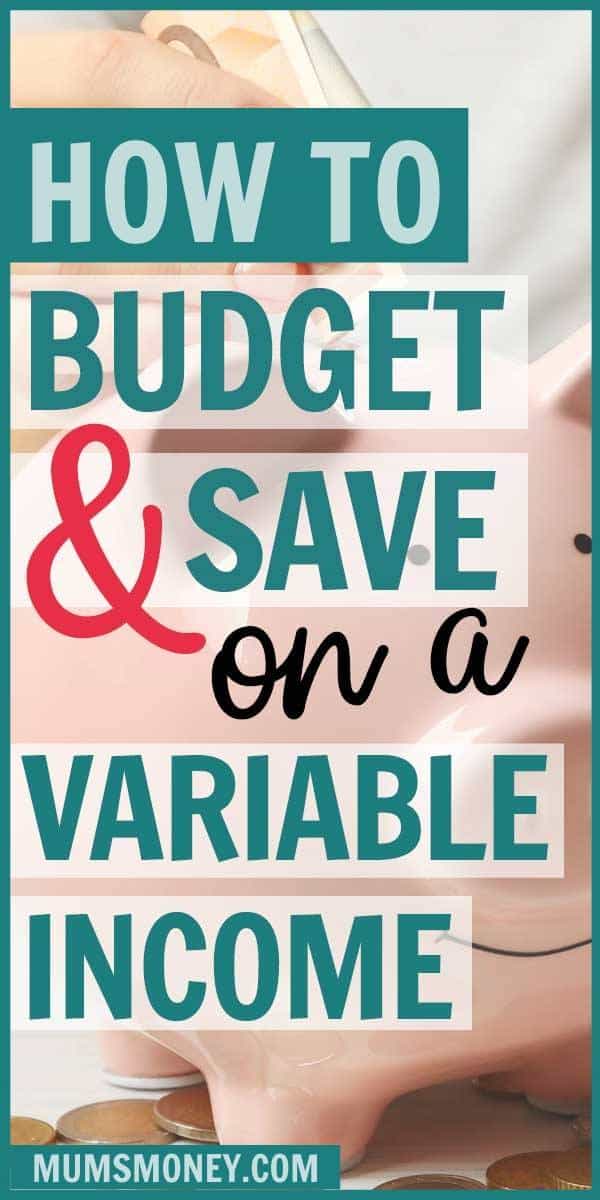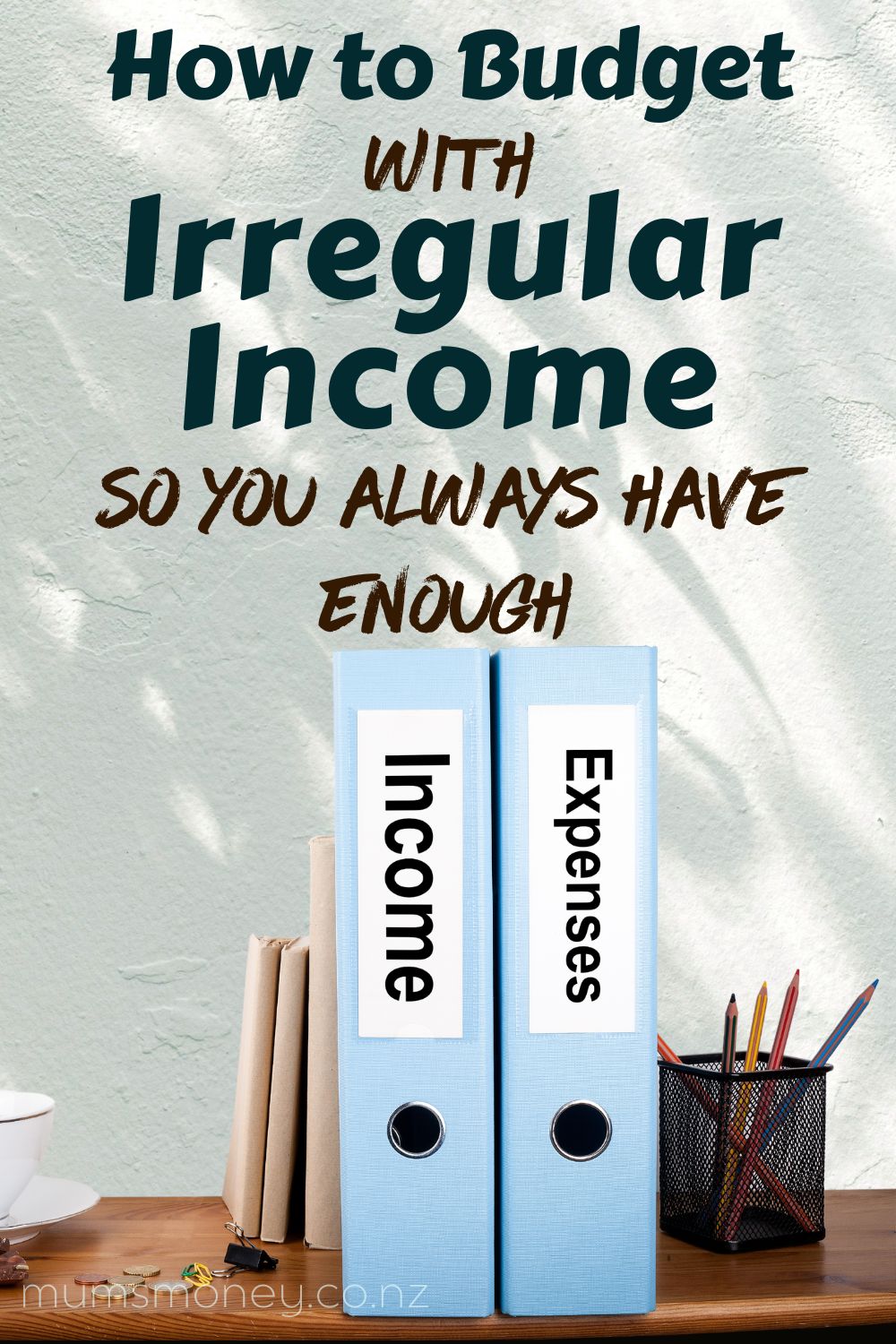Managing your family budget with a variable income can be a challenge.
Irregular paydays can test even the most astute budgeter so it’s important to be vigilant when planning how you’ll manage your money when your income fluctuates.
We are currently living with (and thriving on) a variable or irregular income. It wasn’t always easy though.
Last year my husband started a new job, in a new industry to him. Although the base salary was low, he accepted the job as it was close to home.
This lifestyle job aligns closely with our life goals of more family time and less stress.

Financially, it would provide a living closely in step with our basic budget, we were going to be ok, but we wouldn’t be getting rich.
A few weeks after he started, the company’s bonus scheme was explained to him.
There was the potential for him to earn almost 50% extra each week if he became ultra-productive.
After a few months, he started to make his bonus, some weeks he’d bring in an extra $40, on excellent weeks it’d be more like $300.
Either way, week to week, his income varied greatly.
Being the savers and planners that we were, I must say I struggled with this way of getting paid.
I really liked having a big-picture idea in my head of what money was coming in and when.
I had to find a way to ensure all the bills were paid, but also give us money to save for travel and our life goals of early semi-retirement.
It was here when my backward budget really came into its own. Our budget is based on our bare essential costs of living.
That means we have to be frugal all the time, but we are able to save and invest heavily with what’s left over.
This system of budgeting can work perfectly for those of you on a variable income, also.
Table of Contents
How to Budget on a Variable Income

1. Get a month ahead
This is the hardest step, but it’s the most important when it comes to figuring out how to budget with a variable income.
In order to get one month ahead on your budget, you need to carefully calculate exactly what you need to spend each month and then allow an extra buffer.
We figured we’d need $2500 per month to pay all of our bills and feed the kids well.
We had that amount in savings, but if you don’t have savings, I recommend checking out this post on how to get a month ahead on bills.
I also recommend having a fully funded emergency fund. It’s one of the best forms of insurance you can have.
2. Budget on your lowest monthly amount
The real key to managing a variable income budget is knowing your floor. What’s the absolute minimum you could earn in a month?
If your lowest amount does not cover your living costs due to the peaks and troughs of variable incomes – commissions not being due, low bonus season, lack of hours, etc you need to work on a bare minimum to cover your costs and go back to step 1 to get a month ahead.
As you will be a month ahead, you can adjust spending down where needed and try to hustle up more income.
I personally always budget monthly by allowing a set amount each month for essential living costs.
On the first day of the month, I transferred the amount of $2500 from our Savings account to our Bills account.
I then pay all the essentials – transferring the monthly amount to the mortgage, a monthly grocery allowance to the Grocery account, and keeping what’s leftover in the Bills account for direct debits.

3. Accumulate funds in a separate account
All the wages and extras – my business income and tax credits – accumulate in the ‘Savings’ account.
I leave them there until we hit our monthly sum of $2500.
Sometimes that will take 4 pay weeks; sometimes it takes 3.
We’ve had some cracking bonus weeks’ where we’ve hit our living costs for next month in 2 weeks. I love those months but they’re not the norm.
The next step is the same regardless of how long it takes to hit $2500.
I gleefully transfer the excess into our early retirement investment account.
For now, that is our main focus, so we save towards that each month.
(Side note: this is why the 50/30/20 Budget wouldn’t work for us – we can’t allocate an exact % each month).
4. Live like the monthly sum is all you have
This is perhaps the most testing step; you must live as if you only have your monthly allowance. In the beginning, I struggled with this.
I knew I had more money in a different account, but now it’s second nature to only spend the set amounts in each category of our budget.
Having a large lump sum for my groceries each month is especially helpful, as it allows me to stock up on bulk buys or clearance deals.
5. Review and amend
At the end of each month, I review our spending to ensure we haven’t overspent.
I also review whether we’ve given ourselves enough to live comfortably.
If I need to adjust up or down, I can.
Living on a variable income can be difficult, but it’s not impossible.
You have to lean towards frugality to make your money work on a variable income, but it’s a skill that’ll stay with you for life.
We will continue to budget this way, regardless of how much our earnings increase.
It’s the perfect antidote to lifestyle inflation and allows us to chip away at our financial goals on a small income.
